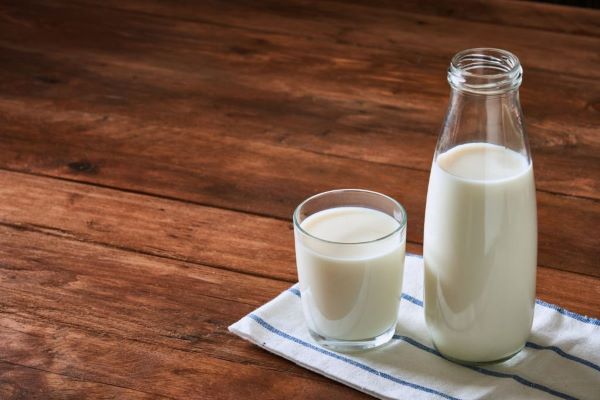Picture this: You’re preparing your morning smoothie, hoping to pack in as much nutrition as possible. You’ve got your fruits for a good dose of Vitamin C and some milk for a protein kick. But wait! You’ve heard somewhere that combining Vitamin C with milk might not be a good idea. Could that be true?
Vitamin C is a potent nutrient that plays a critical role in our health, from supporting a robust immune system to promoting skin health. However, rumors abound that combining Vitamin C and milk may lead to a nutritional faux pas, impeding your body’s absorption of this essential vitamin.
In this blog post, we will delve into the science of nutrient absorption and dispel the myths surrounding Vitamin C intake with milk. Buckle up for a journey through your body’s complex nutritional highway.
The Myth: Vitamin C with Milk Have Negative Impacts
The debate around the consumption of Vitamin C in milk is rooted in the belief that milk, an alkaline substance, might neutralize the acidic environment that Vitamin C requires for absorption.
This belief raises concerns about the potential decrease in the bioavailability of Vitamin C when taken with milk.
Do you know there was a popular belief that vitamin C can prevent pregnancy?
Scientific Examination: The Milk and Vitamin C Dynamic
Despite the common belief, scientific research does not conclusively support the theory that milk significantly hinders Vitamin C absorption.
While it’s true that some components in milk, like proteins and fats, can slow down the digestive process, they don’t necessarily interfere with Vitamin C absorption. Contrarily, vitamin C in milk enhances the bioavailability of iron and zinc.
A connection between calcium, milk intake, and lung cancer has recently amazed the scientific community.
In fact, a recent study found that the simultaneous consumption of milk and Vitamin C did not alter the vitamin’s bioavailability unless there were changes in pH and pasteurization. Both these changes can decrease the bioavailability of vitamin C by up to 20%.
The research concluded that Vitamin C’s absorption remained unaffected regardless of whether it was taken with water or milk.

The Role of Dietary Balance
The potential interaction between Vitamin C and milk emphasizes the importance of a balanced diet. While it’s unlikely that consuming Vitamin C with milk will cause significant hindrance in its absorption, a diverse diet that includes a wide variety of nutrients ensures optimal absorption.
You will be surprised to see the vitamin C contents of different types of milk in the following table.
| Milk Type | Avg. Vitamin C Content (mg/dL) |
| Full Fat | 0.29 |
| Skim Milk | 0.15 |
| Vitaminized Milk | 1.1 |
| Chocolate Milk | 0.2 |
Deeper Dive into the Science
Further scientific evidence comes from a study published in the International Journal for Vitamin and Nutrition Research. This research found no significant reduction in Vitamin C absorption when co-consumed with milk or other dairy products.
The findings imply that consuming Vitamin C with milk should not concern the general population.
The Verdict of Science
In light of these scientific studies, the worry about Vitamin C’s absorption when taken with milk, seems to be more myth than reality.
However, it’s always crucial to remember that individual differences in digestion and metabolism can affect nutrient absorption somewhat. Therefore, personal experience should also be considered alongside scientific research.
Vitamin C: A Vital Nutrient for Health
Vitamin C, also known as ascorbic acid, is an essential nutrient for the human body. Known for boosting immune function, this powerful antioxidant also plays a crucial role in several bodily functions.
Roles of Vitamin C in the Body
For starters, Vitamin C aids in producing collagen, a protein necessary for the health of our skin, hair, nails, and connective tissues. It also enhances our body’s ability to repair wounds and maintain the health of our bones and teeth.
Moreover, Vitamin C supports cardiovascular health and improves iron absorption, preventing conditions like iron-deficiency anemia.
Vitamin C for Immune Health
When it comes to immunity, Vitamin C is a game-changer. It stimulates the production of white blood cells, which help protect the body against infections. Additionally, as an antioxidant, it fights off free radicals, reducing oxidative stress and lowering the risk of chronic diseases.
Daily Vitamin C Requirements
For optimal health, adults are advised to consume between 75-90 mg of Vitamin C per day, which can be obtained through a diet rich in fruits and vegetables, especially citrus fruits, strawberries, bell peppers, and broccoli.
However, factors like smoking, pregnancy, and certain illnesses may increase an individual’s Vitamin C requirements.

Effective Consumption of Vitamin C
To get the most out of your Vitamin C intake, a few strategies can be helpful. First, it’s important to note that Vitamin C is water-soluble. It isn’t stored in the body like fat-soluble vitamins, so we need a consistent supply in our diet.
Vitamin C-Rich Foods
Incorporate various Vitamin C-rich foods, such as citrus fruits, strawberries, bell peppers, broccoli, and kiwi. Fresh and lightly cooked foods are best, as heat and storage can decrease the Vitamin C content.
Optimal Timing of Vitamin C Intake
The timing of Vitamin C intake may also be important. Since Vitamin C enhances iron absorption, consuming Vitamin C-rich foods and iron-rich foods can benefit vegetarians or those with iron-deficiency anemia. As per the question, no need to worry about taking Vitamin C with milk.
Vitamin C Supplements: When Needed
While a balanced diet should provide adequate Vitamin C for most people, certain populations may benefit from supplementation.
These include smokers, people with limited food variety, and those with certain chronic diseases. It’s essential to consult with a healthcare provider before starting any supplementation regimen.
A Note on Vitamin C and Skin Health
Finally, for those interested in the skin health benefits of Vitamin C, it’s worth noting that topical Vitamin C serums may provide additional benefits beyond dietary intake. The skin’s outer layer has a higher concentration of Vitamin C than the inner layer, and topical application can help replenish this important antioxidant in the skin.
Conclusion
According to current scientific evidence, the combination of Vitamin C and milk doesn’t significantly impact this vital nutrient’s absorption.
Still, it’s always beneficial to maintain a diverse and balanced diet for optimal health. Individual differences in digestion and nutrient absorption exist, making personalized dietary advice essential.
While it’s important to consume Vitamin C-rich foods regularly due to their water-soluble nature, individual needs may vary. Always consult with a healthcare provider or dietitian for personalized dietary advice.
Keep learning, keep questioning, and keep striving for better health. And stay with SupplementSalon.

I am a health and wellness enthusiast working in a Pittsburgh-based wellness clinic. My primary role as a consultant is to tailor a balanced lifestyle for my patients, where positive steps and potent supplements play a synergistic role.

